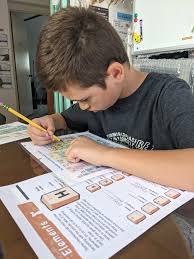Introduction
Did you know that about 40% of students find it hard to stay motivated when studying, especially in grades 8 and 9? These years are crucial because they set the foundation for high school and beyond. The right encouragement can truly make a difference in how students approach their studies.
Imagine a classroom where every student is eager to learn, tackling challenges with confidence and celebrating their successes. This isn’t just a dream—it can be a reality with the right strategies and support.
In this article, we’ll look at easy ways to help spark a love for learning in students. Whether you’re a student yourself, a parent, or a teacher, these tips will help make studying something to enjoy!
Understanding Student Motivation
Motivation is simply the desire to do something. For students, this usually means studying. Understanding motivation can help you stay focused and excited about your studies.
There are two main types of motivation:
- Intrinsic Motivation: This is when you study because you love learning or want to achieve something for yourself. For example, you might study hard because you enjoy discovering new things or want to master a subject.
- Extrinsic Motivation: This comes from outside factors, like wanting a good grade, earning praise from teachers and parents, or receiving rewards. Maybe you study to earn a special treat or to impress someone.
Knowing what motivates you can help you stay engaged and excited about learning.

Create a Positive Learning Environment
A positive learning environment is like good soil for plants—it helps you grow! When you feel safe, respected, and supported, you’re more likely to want to learn.
- Talk Openly: Don’t be afraid to speak up if you don’t understand something. If you’re comfortable sharing your thoughts, learning becomes easier and more fun. Teachers appreciate when you ask questions because it shows you’re engaged.
- Work Together: Group work can make studying more enjoyable. You get to learn from others, share ideas, and help each other out. Collaborating with classmates can lead to deeper understanding and make learning less intimidating.
- Create a Comfortable Space: If you’re studying at home, set up a space that feels good to you. Make sure it’s quiet, organized, and has all the supplies you need. This way, you can focus better and feel more at ease while studying.

Set Clear Goals
Setting clear goals gives you something to aim for, which helps you stay on track. Goals act like a roadmap for your studies.
- Short-Term Goals: These are small goals you can achieve quickly. For instance, you might aim to finish a homework assignment by a certain time or to study a specific chapter for an upcoming quiz.
- Long-Term Goals: These are bigger goals, like improving your grades by the end of the semester or mastering a subject by the end of the school year. Long-term goals give you a sense of direction and purpose.
When setting goals, make sure they’re realistic. Achieving small goals can boost your confidence and motivate you to tackle bigger challenges!
Use Fun and Engaging Methods
Studying doesn’t have to be boring! Here are some ways to make learning more enjoyable:
- Play Games: Turn study sessions into games or quizzes. Use flashcards to test yourself or compete with a friend to see who knows more. Learning through games can make even the toughest subjects more entertaining.
- Get Hands-On: Try activities that let you learn by doing. If you’re studying science, conduct simple experiments. If you’re learning about history, create timelines or make posters. Engaging with the material in a hands-on way can make the information stick better.
- Incorporate Technology: Use educational apps or websites that make learning interactive. Apps like Kahoot! or Quizlet let you study through games and quizzes, making the process fun and dynamic.
Encourage Self-Reflection
Self-reflection means taking a moment to think about what you’ve learned. It helps you understand your strengths and where you might need more help.
Why Self-Reflection Matters
- Connect Learning to Your Goals: When you think about your learning journey, you can see how it connects to your personal goals. Understanding how your studies fit into your future can keep you motivated.
- Build Critical Thinking Skills: Reflecting on what you’ve learned helps you think deeper about the material. This is important for solving problems and applying what you know in different situations.
- Grow Your Emotional Intelligence: Understanding your feelings about studying—whether you felt excited, frustrated, or confused—helps you manage your emotions better. It’s okay to feel challenged; what matters is how you respond to those feelings.
Practical Ways to Foster Self-Reflection
- Keep a Journal: Write about what you learned each day and how you felt about it. For example, you might write, “Today, I struggled with fractions, but after practicing, it started to click. I need more practice with word problems.” Journaling helps you process your experiences and see your growth over time.
- Ask Yourself Questions: At the end of each study session, think about questions like, “What did I learn today?” and “What could I do better next time?” These reflections can guide your future study sessions.
- Share with Friends: Talk about your learning experiences with classmates. Discussing what you learned can help you see things differently and gain new ideas. Peer discussions can lead to greater insights and understanding.

Provide Regular Feedback
Feedback is like a roadmap that shows you where you are and where you need to go. It’s important for motivation because it helps you understand your progress.
The Impact of Constructive Feedback
- Boosts Confidence: Positive feedback highlights what you’re doing well. When you know what you’ve accomplished, it motivates you to keep going. For example, if a teacher praises your essay, it can inspire you to write even better next time.
- Gives Clear Direction: Constructive feedback shows you how to improve. Instead of just saying, “You got it wrong,” it helps you understand how to do better next time. Specific guidance makes it easier to take action.
- Encourages a Growth Mindset: When feedback focuses on effort and improvement, it helps you see challenges as chances to learn and grow. This mindset encourages resilience and a willingness to tackle difficult subjects.
Best Practices for Giving Effective Feedback
- Be Timely: Give feedback soon after a task is completed. This way, the experience is fresh in your mind, and you can use the advice right away. Timely feedback shows that you care about the learning process.
- Be Specific: Instead of saying, “Good job,” provide details. For example, say, “Your essay was well-organized, and your arguments were strong. Next time, try adding more examples to support your points.” Specific feedback helps you understand what to keep doing and what to change.
- Balance Positives and Improvements: Start with what someone did well, then gently address areas for improvement. This keeps feedback encouraging and motivates you to keep trying.
Incorporating Technology in Learning
Technology can make studying more fun and engaging. There are many educational apps and websites that can help you learn.
- Educational Apps: Apps like Quizlet and Duolingo turn studying into a game. You can earn points, compete with friends, and track your progress. These apps make learning feel less like a chore and more like a challenge.
- Online Resources: Websites like Khan Academy offer free lessons and practice exercises. You can study at your own pace and find materials that help you. Using different types of resources can make studying feel more dynamic and less repetitive.
- Virtual Study Groups: Technology allows for virtual study groups. You can connect with friends online to review material, quiz each other, or just discuss what you’ve learned. This can add a social element to studying, making it more enjoyable.

The Importance of Support Systems
Having support from parents, teachers, and friends is crucial for motivation. Knowing that people care about your success makes studying easier and more enjoyable.
- Parental Involvement: Parents can help by checking in on your homework, offering encouragement, and celebrating your achievements. A little praise can go a long way in boosting your confidence.
- Peer Study Groups: Studying with friends can make learning more fun. You can quiz each other, share notes, and motivate each other to keep going. Learning together can create a sense of community that encourages everyone to do better.
- Teacher Support: Don’t hesitate to ask teachers for help. They can provide guidance, resources, and encouragement to help you succeed. A good relationship with your teachers can make a big difference in your motivation to learn.

FAQs
How can I help my child who lacks motivation?
Start by talking about their interests and struggles. Encourage them to set small, achievable goals, and create a supportive environment. Being involved and showing interest in their education can make a big difference.
What are some signs of motivation issues in students?
Signs may include a lack of interest in schoolwork, declining grades, or frequent complaints about homework. If a student seems disengaged or withdrawn, it may be time to address their motivation.
Can rewards help motivate students?
Yes, rewards can be helpful, but they should be used wisely. Focus on intrinsic motivation—helping students find enjoyment and satisfaction in learning—will lead to long-term success.
Conclusion
Motivating students to study is a crucial part of their learning journey. By using the strategies discussed in this article, you can create a supportive environment that encourages engagement and enjoyment in studying. Remember, every student is unique, and finding what motivates each person may take time.
With patience and the right approach, you can help students develop a love for learning that lasts a lifetime. Let’s work together to make studying a positive and enriching experience for all students




